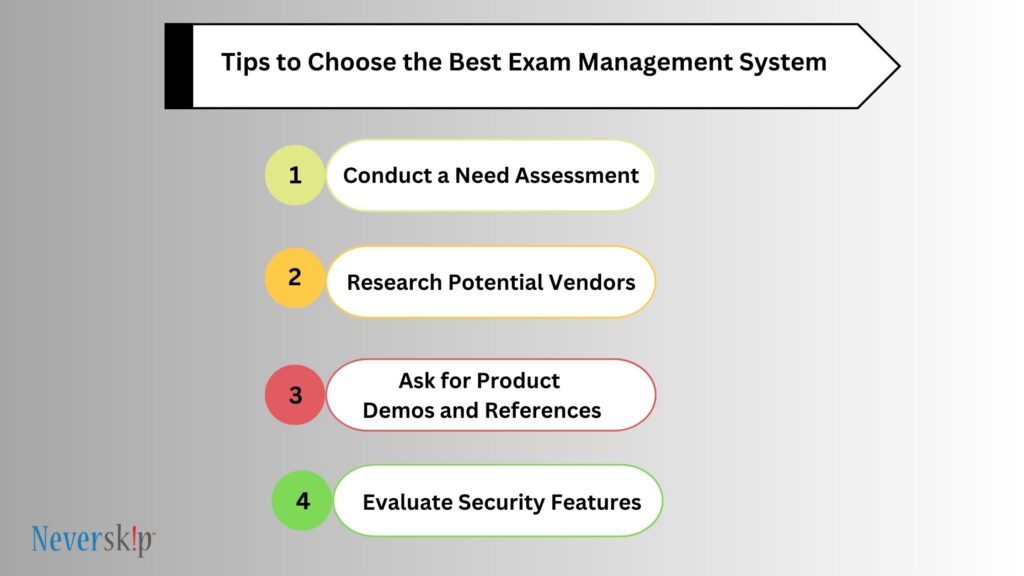From creating exam schedules to ensuring high security, exam management is a complex and time-consuming process. And only a sophisticated exam management system can provide a robust solution to streamline the entire exam process.
However, with so many options available in the market, choosing the right exam management system can be a daunting task. A poorly chosen system can result in frustration, wasted resources, and negative impacts on student outcomes.
On the other hand, a well-selected system can save time, reduce costs, and enhance the overall exam experience for everyone involved.
In this blog, we’ll explore the key factors to consider when choosing an exam management system for your institution. We’ll look at the features, functionalities, and integrations you should look for, as well as the importance of scalability and ease of use.
By the end of this blog, you’ll have a clearer understanding of what to consider when choosing an exam management system.
So, whether you’re looking to replace an outdated system or implement one for the first time, read on to discover how to choose the best exam management system for your institution.
The Key Features of an Exam Management System
An exam management system is an essential tool for any educational institution that wants to streamline its examination process.
It is a software application that automates various exam-related activities, such as exam scheduling, student information management, and online examination administration. Let’s take a closer look at its key features.

Neverskip Exam Management System Features
1. Robust Security
One of the most critical features of an exam management system is security. It is essential to ensure that the system is secure and protected from unauthorized access.
The system should have strong authentication mechanisms, such as two-factor authentication, to ensure that only authorized users can access it.
It should also have robust data encryption to protect sensitive data such as exam questions, student records, and exam results.
In addition, the system should have features such as user access control, audit trails, and activity logs to monitor and track all user activities.
This will help to detect any unauthorized access or suspicious activities and prevent any security breaches. A secure exam management system will ensure that the integrity and confidentiality of exam data are maintained.
2. High Scalability
Another important feature of an exam management system is scalability. It should be scalable to accommodate the increasing number of students, exams, and exam centers.
In addition to that, it is crucial for an exam management system to handle a large number of users concurrently without any performance issues. This is particularly important during peak periods when there are many exams taking place simultaneously.
The system should also be able to handle different types of exams, such as multiple-choice questions, essay-type questions, and practical exams, while also supporting various question formats, including audio and video questions.
3. Ease of Use
An exam management system should have a simple and intuitive user interface that can be easily navigated by all users, including students, teachers, and administrators.
The system should also have clear instructions and guidelines for each task, such as exam scheduling and result publishing.
It should also be accessible from different devices, including laptops, tablets, and smartphones. This will enable students and teachers to access the system from anywhere, at any time.
4. Integration with Existing Systems
A smart exam management system should be able to integrate seamlessly with other existing systems, such as student information systems, learning management systems, and content management systems.
Integration with student information systems is particularly important as it will enable the system to access student records, such as attendance, grades, and academic history.
This will help the system to identify eligible students for exams and ensure that only authorized students take the exams.
5. Customization Options
An exam management system should provide customization options to meet the specific needs of the institution. The system should be flexible enough to accommodate different exam formats, rules, and regulations. It should also be customizable in terms of the user interface, such as colors, logos, and branding.
The system should also be able to generate custom reports and analytics, such as exam statistics, student performance reports, and faculty performance reports. This will enable the institution to track and analyze its exam performance and identify areas for improvement.
Tips to Choose the Best Exam Management System
Choosing the best exam management system for your educational institution can be a daunting task. With so many options available, it can be challenging to evaluate and select the right system that meets your institution’s specific needs.
However, choosing the right exam management system is crucial for the smooth and efficient administration of exams. In this section, we will provide some tips on how to choose the best exam management system.

Tips to choose an exam management system
1. Conduct a Need Assessment
Before selecting an exam management system, it is important to conduct a need assessment to identify the specific requirements of your institution.
The needs assessment should include evaluating the current exam process and identifying the pain points and areas for improvement.
The assessment should also identify the specific features and functionalities required for the new system, such as exam scheduling, student information system, and online examination system.
It is essential to involve all stakeholders, including teachers, administrators, and invigilators, in the need assessment process to ensure that all requirements are considered.
By doing this, you can identify the specific features and functionalities that your institution needs and avoid selecting a system that does not meet your institution’s requirements.
2. Research Potential Vendors
After conducting a need assessment, it is important to research potential vendors that provide exam management systems.
It is important to research quality vendors and evaluate their offerings to determine which one meets your institution’s specific needs.
Some of the factors to consider when evaluating vendors include the vendor’s experience, reputation, and customer support. It is important to select a vendor with a good reputation and experience in the education industry.
The biggest non-negotiable should be excellent customer support, including training, implementation, and ongoing support.
3. Ask for Product Demos and References
Once you have identified potential vendors, it is important to ask for product demos and references in order to see how the system works and evaluate its features. A demo will also enable you to assess the ease of use and user interface of the system.
It is also important to ask for references from the vendor. References will enable you to speak to other institutions that have implemented the system and evaluate their experience.
You can ask about their experience with the system, including its features, functionalities, and customer support. References will provide valuable insights into the system and help you make an informed decision.
4. Evaluate Security Features
Security is a critical factor to consider when choosing an exam management system. The system should have robust security features to protect sensitive data, such as exam questions, student records, and exam results. The system should have strong authentication mechanisms, such as two-factor authentication, to ensure that only authorized users can access it.
The system should also have data encryption to protect sensitive data during transmission and storage. It should also have user access control, activity logs, and audit trails to monitor and track all user activities. By evaluating the security features of the system, you can ensure that the integrity and confidentiality of exam data are maintained.
Achieve Exam Excellence With Neverskip Exam Management System
Experience streamlined scheduling, automated grading, and insightful analytics with Neverskip’s exam management system. Maximize efficiency, accuracy, and student performance. By investing the time and effort in selecting the right solution, you can empower your institution to excel in managing exams effectively.
Request a demo of our powerful exam management system or contact us today to learn more about our system.







